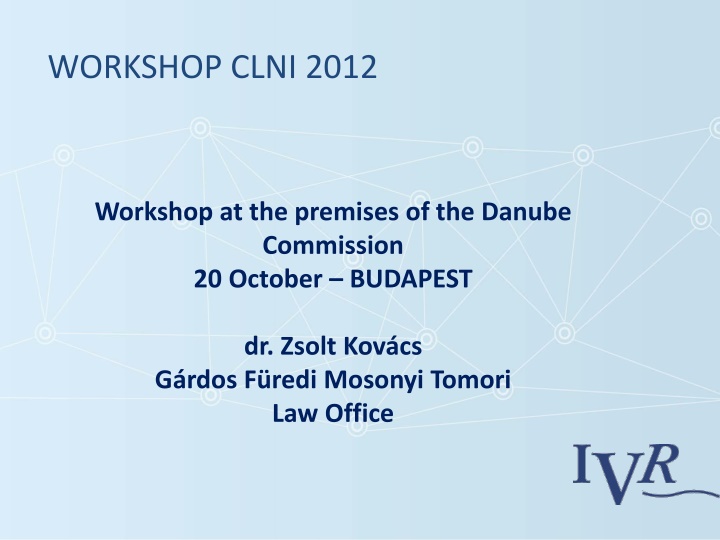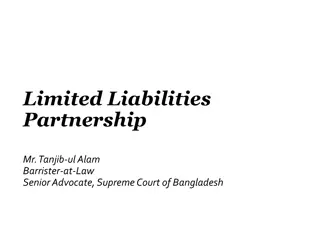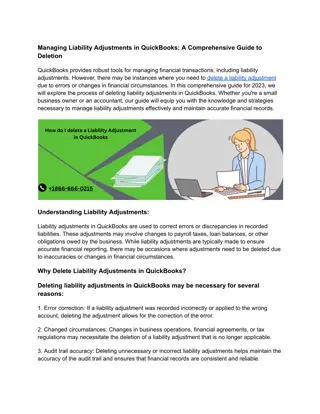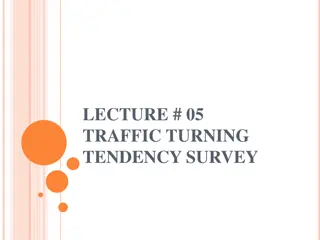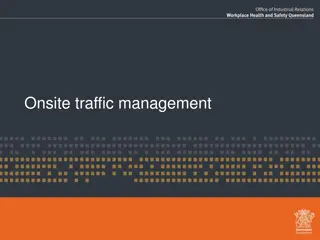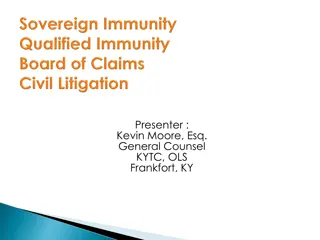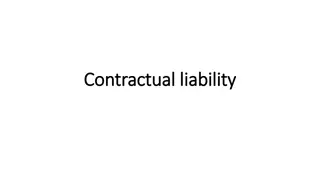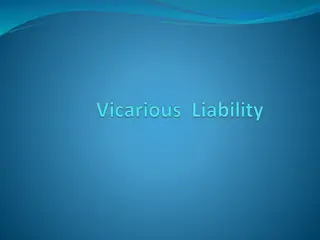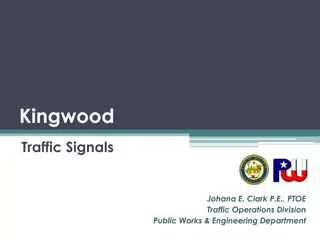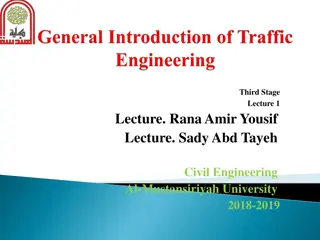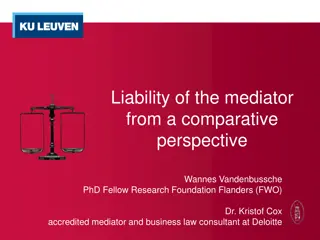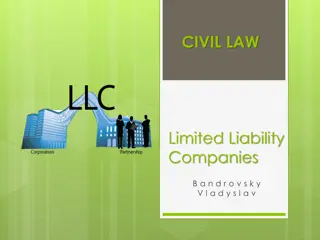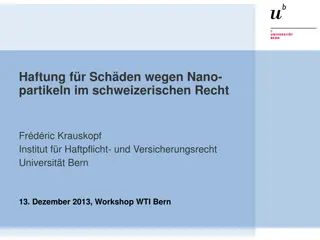Importance of Limitation of Liability in International Traffic and CLNI 2012 Workshop Overview
Understanding the significance of limitation of liability in international traffic is crucial due to the potential for serious damage and financial risks. The CLNI 2012 workshop at the premises of the Danube Commission in Budapest delved into the challenges and operations of limitation funds in the context of non-contractual liability on the Danube, including the impact of international conventions and local laws in different countries along the waterway.
Download Presentation

Please find below an Image/Link to download the presentation.
The content on the website is provided AS IS for your information and personal use only. It may not be sold, licensed, or shared on other websites without obtaining consent from the author.If you encounter any issues during the download, it is possible that the publisher has removed the file from their server.
You are allowed to download the files provided on this website for personal or commercial use, subject to the condition that they are used lawfully. All files are the property of their respective owners.
The content on the website is provided AS IS for your information and personal use only. It may not be sold, licensed, or shared on other websites without obtaining consent from the author.
E N D
Presentation Transcript
WORKSHOP CLNI 2012 Workshop at the premises of the Danube Commission 20 October BUDAPEST dr. Zsolt Kov cs G rdos F redi Mosonyi Tomori Law Office
Overview Importance of limitation of liability in international traffic Limitation of non-contractual liability on the Danube The challenges of CLNI 2012 on the Danube The IVR Guidelines Conclusion
Importance of limitation of liability in international traffic I. Huge potential of causing serious damage (density of traffic + units with considerable speed and weight) Unlimited liability potential liability is much higher than the financial capacity of the operator Discourage competition Risk for potential claimants Liability insurance is Not available Inadequate Unreasonably expensive
Importance of limitation of liability in international traffic II. Long tradition of limitation for contractual claims (Hague Rules, CMR, CIM, Montreal Convention 1999, CMNI) Non-contractual claims Sea - London Convention 1976 Air Rome Convention 1952 (to be replaced by the Montreal Conventions 2009) Carriage of dangerous goods CRTD Convention 1990 Inland waterway - CLNI 1988
Limitation of non-contractual liability on the Danube International conventions CLNI 1988 not applicable 1976 London Convention (1996 Protocol) applies in Hungary Croatia also for inland navigation Bulgaria Romania (Ukraine local law incorporating London Convention)
Limitation of non-contractual liability on the Danube Local laws Limited liability Croatia 1976 London Convention Austria (value of ship, exception: pollution) Bulgaria (value of ship, exception: pollution) No limitation Hungary Slovakia Romania Ukraine
The challenges of CLNI 2012 on the Danube Limitation of non-contractual liability = matter of public policy Operation of limitation funds
Limitation of liability Different countries different challenges Lower limits (London Convention) Higher limits (ship value) Limitation newly introduced (in general or to see pollution) certain areas "Limitation of non-contractual liability is against public policy Already exists in numerous international conventions (e.g. nuclear damage, maritime traffic) to which the riparian countries are members It is better to have a limited liability which will be paid for than an unlimited liability which remain unpaid
Operation of limitation funds I. Unknown in most Danube countries (Exception: Croatia) No special local law rules Despite (partial) applicability of 1976 London Convention Hungary a weird example Hungary has ratified the 1976 London Convention Therefore it should be possible to establish a limitation fund Respective rules do not exist = In practice it is not possible
Operation of limitation funds II. Issues to be addressed Choosing and preparing the right organization (court vs. Authority) Legal form of the limitation fund Procedural rules (claim against the fund) Option to exclude limitation if no fund is established
The IVR Guidelines Overview Practical experience of implementing CLNI 1988 of Germany The Netherlands Switzerland Covered issues Implementation methods Invoking limited liability Establishment of the limitation fund Effect of the establishment of the limitation fund Distribution of the limitation fund
The IVR Guidelines Implementation 1. Two possible approaches Direct applicability ratification + if the national law so requires announcement of the text of the international convention Transposition into national law National legal regulation containing the provisions of the international convention Direct applicability of CLNI 1988 The Netherlands Switzerland Transposition of CLNI 1988 Germany (Binnenschiffahrtsgesetz Inland Navigation Act)
The IVR Guidelines Implementation 2. CLNI (1988 and 2012 alike) Material rules of limitation as per the CLNI or the national regulation tansposing CLNI CLNI does not cover procedural questions (in particular the rules of establishment and distribution of the limitation fund) Separate set of procedural rules Netherlands Code of Civil Procedure Germany Special act (Shipping Distribution Act for sea and for inland navigation) Switzerland Procedural rules of the implementing regulation of the Maritime Navigation Act
The IVR Guidelines Invoking the limited liability CLNI 2012 (also CLNI 1988) Limitation is applicable with or without establishing a limitation fund The States may however make the application of limitation subject to the establishment of a limitation fund Limitation fund is required Netherlands Switzerland Limitation fund is possible, but not a precondition for limitation Germany
The IVR Guidelines Establishment of a limitation fund 1. CLNI 2012 (also CLNI 1988) Court or Designated authority Court is entitled to act in all 3 countries (special professional knowledge does exist at the courts) Special (non-litigation type) court procedure The fund may be a deposit or a guarantee The national laws set the detailed requirements and procedural rules for the deposit and the guarantee (e.g. in Switzerland the guarantee can be issued by a bank or an insurance company and it must be in favour of the court)
The IVR Guidelines Establishment of a limitation fund 2. Court decides over the amount (in accordance with the rules set by CLNI) of the fund (it may be necessary to set up more funds) the acceptability of the guarantee (if not enforcable?) Potential creditors/claimants Identification by the court Oral hearing (Netherlands) Notification (directly by mail or publication, no hearing Switzerland) When? Before or after proceedings were started against the liable party
The IVR Guidelines Establishment of a limitation fund 3. Where? - In the states where a claim has been or may be instituted Fund covers the liability of all persons related to the vessel that suffered the accident (i.e. Owner, operator, charterer, salvors) Brussels I. EU regulation - the place of the accident and the seat of the defendant both can be a place for starting proceedings If persons of different nationality involved (e.g. a Hungarian company operates a vessel owned by a German and chartered by a Dutch company which suffers an accident in Romania) theoretically funds should be established in all four states (supposing they all ratified CLNI) Forum shopping?
The IVR Guidelines Effects of the establishment of a limitation fund Claims can be instituted only against the fund Other procedures must be terminated Securities (e.g. Arrest of ships) must be released Only those creditors are affected which can claim against the fund it is vital for the shipowner that all potential creditors know about the fund!
The IVR Guidelines Handling and distribution of the limitation fund 1. CLNI only regulates the basic rules of distribution Details and procedure are to be regulated in the national laws The procedures have some differences, but the general rules are identical An administrator is designated by the court, which is supervising its activity The procedure is pretty similar to the liquidation procedure
The IVR Guidelines Handling and distribution of the limitation fund 2. Creditors (claimants) have a certain time to report their claims The administrator revises the claims and sets up a schedule of claims This can be contested by the creditors The court decides on the approval of the final schedule (including the distribution) Some special rules
The IVR Guidelines Handling and distribution of the limitation fund 3. Special rules Netherlands Creditors meeting under the supervision of the court to discuss the schedule of claims and settle potential disputes Once that meeting has been concluded validation procedure ending in a final decision Switzerland No creditors meeting Notification of known creditors and publication of the schedule of claims If any of the claims is disputed creditors have to sue each other
Conclusion CLNI 2012 will be soon a fact of life affecting also the shipping companies, insurers and potential claimants of those countries that do not ratify the Convention Limitation of non-contractual liability by international conventions is already a fact in the Danube countries in many areas Limitation funds should be workable even without ratifying CLNI There are existing solutions that can be used as examples The existing solutions in Rhine countries follow the same patterns in principle, but they all take into account the specific features of national systems RATIFICATION = Mission possible
WORKSHOP CLNI 2012 Thank you for your attention! 1056 Budapest, V ci u. 81. Telefon: +36 1 327 7560 Fax: +36 1 327 7561 E-mail: kovacs.zsolt@gfmt.hu www.gfmt.hu
